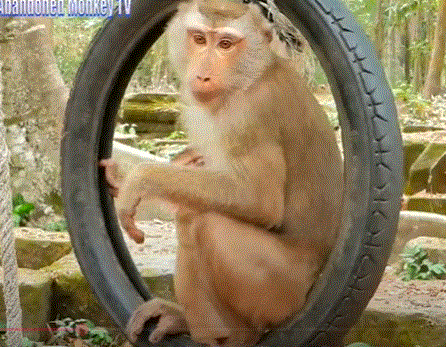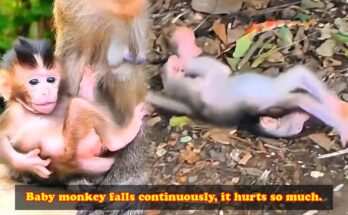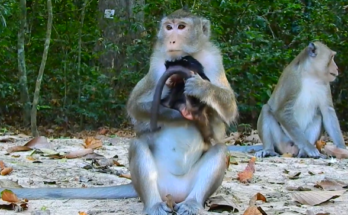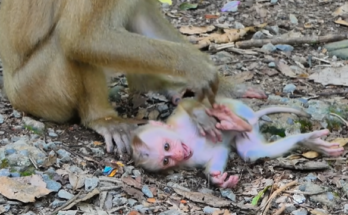In the heart of Angkor Wat’s lush forest, where ancient ruins whisper stories of centuries past, a scene unfolded that would leave anyone’s heart aching with empathy. Baby Leo, a tiny, innocent monkey, found himself in a situation no little creature should ever face. His small head had become stuck in the wheel of an old motorcycle abandoned among the ruins, and he hung helplessly from a nearby tree.

From the moment I spotted him, the sound of his cries pierced the serene jungle atmosphere. It wasn’t just a squeak or a simple alarm—it was a pure, uncontrollable outpouring of fear and pain. Each tear he shed sparkled in the sunlight, rolling down his tiny face as he struggled, calling for help in a way that made the forest seem to pause and listen.
I approached cautiously, knowing that any sudden movement could frighten him further. Baby Leo’s eyes were wide with panic, and he flailed gently, trying to free himself. Watching him, I couldn’t help but remember the fragility of life, how a single moment can turn from playful curiosity to desperate struggle. The jungle, usually alive with the chatter of other monkeys, seemed to fall silent in solidarity with his cries.
With careful movements, I examined the situation. The wheel was rusty, and Leo’s head was wedged tightly—but his spirit remained unbroken. He continued to cry, each tear seeming to echo a story of vulnerability, trust, and the raw instinct for survival. Nearby, a mother monkey watched, unsure how to help her little one but clearly aware that he needed assistance. The bond between them was visible even from a distance: the mother’s eyes followed every small movement, a mix of worry and helpless love etched across her tiny face.
As I slowly reached for the wheel, I felt a wave of both fear and hope. Fear that I might accidentally hurt him, hope that this small life could be freed without further harm. It was a delicate balance of instinct and care. Baby Leo’s cries softened as he sensed my presence, perhaps realizing that help had arrived. The tension in the air was tangible; it felt as though the ancient stones themselves were holding their breath alongside us.
Finally, with a gentle but firm maneuver, the wheel released its grip, and Baby Leo tumbled safely into the soft grass below. Relief washed over him instantly. He shivered, then looked up, as if to say thank you, before scampering into the protective embrace of his mother. The forest seemed to exhale, returning its normal chorus of life and movement, but the moment lingered in my heart forever.
This scene, raw and emotional, is a reminder of how fragile innocence can be, how quickly fear can take hold, and how powerful compassion is in restoring safety and hope. Baby Leo’s cries were more than just sounds—they were a story, a plea, and ultimately a testament to the courage that even the smallest creatures carry within them.
For anyone watching, this is not just a video of a baby monkey in distress. It’s a window into the delicate balance of life in the wild, the bonds of family, and the moments that make us pause and truly feel.
Baby Leo’s story is a testament to resilience, care, and the universal language of empathy. Each cry, each tear, each frantic little movement reminds us that even in moments of fear, there is hope—and often, help is just within reach.


